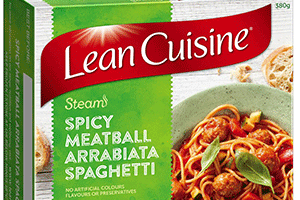Lean Cuisine is a range of frozen prepared meals low in fat and free from artificial colours, flavours and preservatives. They are cooked and frozen to maintain nutrition and taste.


As a result of this decision, Simplot Australia has announced the proposed closure of its Pakenham manufacturing facility.
The decision coincides with the end of long-term manufacturing agreements that are due to conclude in November 2019.
Simplot Australia managing director Graham Dugdale said Simplot would be undertaking widespread consultation with its employees and key stakeholders about the proposed closure.
“We do not envisage any impact to our current supply and trading relationships,” Mr Dugdale said.
Products currently manufactured at the Pakenham site include chilled pasta and sauce, potato pommes and frozen meals.
No other Simplot manufacturing sites will be impacted, a company statement said.
Simplot is aiming to provide a final decision on the proposed closure by the end of September 2018.
Nestle at the same time announced it is considering alternative options for its Lean Cuisine brand in Australia, including selecting a new partner to manufacture and market the frozen meals.
The announcement follows the decision by Simplot Australia not to renew its licence agreement to manufacture and market Lean Cuisine in Australia from end November 2019.
Simplot has manufactured and marketed Lean Cuisine under licence since 2009.
Nestlé is the world’s largest food company
Nestlé is the world’s largest food company which is $27 billion operation in the US.
It has been active in repositioning its business for much of the last year in an effort to stoke growth, focusing its capital spending efforts on high-growth food and beverage categories such as coffee, pet care, infant nutrition and bottled water.
The Swiss-based company has a broad portfolio that includes everything from Lean Cuisine and Toll House chocolate chips to Dreyer’s ice cream and S.Pellegrino sparkling water.
Nestlé’s growth plan incorporates a three-prong approach popular among CPG companies: internal innovation, partnering with startups and acquisitions.
In the last year, Nestlé has invested in an accelerator program to support emerging food and agriculture startups and rolled out a pair of new products — a frozen food line called Wildscape and Outsiders pizza that pays tribute to under-respected regional styles — to market in less than nine months, much faster than products are usually introduced.
Nestlé also bulked up its exposure in plant-based foods after it snapped up Sweet Earth for an undisclosed sum last September.







